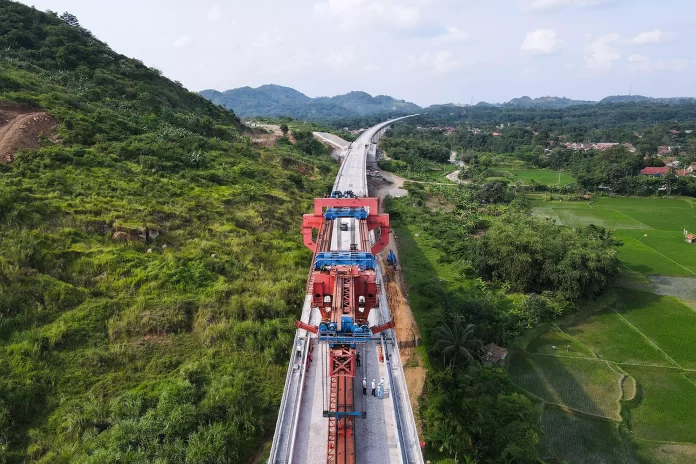China and Pakistan have agreed to expand the Belt and Road Initiative (BRI) into Afghanistan, opening avenues for substantial investment in the country’s infrastructure projects despite ongoing sanctions. This landmark development signifies a pivotal moment in Afghanistan’s reconstruction as it integrates vital components of the China-Pakistan Economic Corridor (CPEC) to foster economic growth and prosperity.
China and Pakistan have agreed to extend the Belt and Road Initiative into Afghanistan, potentially drawing in billions of dollars to fund infrastructure projects in the sanctions-hit country, according to Pakistan’s Foreign Ministry. The agreement was reached in Islamabad on Sunday (May 28). As part of Afghanistan’s reconstruction process, efforts are being made to involve the country in the development initiatives, such as the China-Pakistan Economic Corridor (CPEC).
With a budget of US$60 billion, the CPEC is China’s largest project under the Belt and Road Initiative (BRI) and aims to promote industrialization in Pakistan and boost its economy. Afghanistan’s integration into the CPEC framework is seen as a targeted approach to support its reconstruction and introduce key elements of the project into the country, even though it is currently under the rule of the Taliban.
Amir Muttaqi, Afghanistan’s top diplomat, signed the agreement with his Pakistani counterpart, FM Bilawal Bhutto Zardari, during his second visit to Pakistan. This visit coincided with the United Nations’ call to engage with the Taliban rulers, recognizing the grave humanitarian crisis in Afghanistan as one of the world’s largest.
According to Pakistan’s Foreign Ministry, both sides have agreed to continue their humanitarian and economic assistance to the Afghan people. The extension of the CPEC to Afghanistan is seen as a means to enhance development cooperation and provide much-needed infrastructure investment to the cash-strapped Taliban government.
The Taliban has expressed hopes that China will increase investments in Afghanistan’s abundant resources, estimated to be worth $1 trillion. Earlier this year, the Taliban signed its first contract with a Chinese company, Xinjiang Central Asia Petroleum and Gas Company (CAPEIC), a subsidiary of China National Petroleum (CNPC). The $541 million agreement grants the Taliban a 20% stake in a 25-year oil extraction project in the Amu Darya basin, without requiring any investment, involvement, or risk.
After the withdrawal of US troops from Afghanistan in 2021, Washington froze the overseas assets of the Afghanistan Central Bank, including gold and foreign reserves, and imposed sanctions on the country. Chinese and Pakistani officials have emphasized the need to unfreeze Afghanistan’s overseas financial assets, as the Taliban government has been unable to access approximately $9 billion of Afghanistan’s central bank reserves held abroad due to concerns over their potential use for terrorism.
The United States initially agreed to release half of these funds but changed its decision after the Taliban imposed certain restrictions on Afghan women’s education and employment opportunities. International aid, which accounted for 60% of Afghanistan’s public spending, was also suspended at the request of the United States following the troop withdrawal.
China, Russia, and Iran are among the few countries that maintain unofficial ties with the Taliban. While they have not established full diplomatic relations or formally recognized the Taliban government, they have provided significant financial assistance.
A recent UN agency report highlighted that the Taliban would require $4.6 billion in 2023 to address the pressing humanitarian crisis affecting over two-thirds of the country’s 40 million population, the majority of whom live in extreme poverty. A Gallup poll conducted in 2022 revealed that nine out of ten Afghans find it challenging to survive on their current income.
Chinese businesses have been cautious about investing in Afghanistan due to attacks by the Islamic State group (ISIL), which is competing with the Taliban for influence. In December, ISIL claimed responsibility for an attack on a Kabul hotel frequently visited by Chinese diplomats and business personnel. Additionally, the East Turkistan Islamic Movement, a separatist group based in Xinjiang, has a presence in Afghanistan.
China has been considering Afghanistan’s involvement in the BRI since 2017 when an Afghan delegation participated in the second International Belt & Road Forum in Beijing. Afghan delegates have also been attending investment events in Russia, such as the St. Petersburg International Economic Forum.
China aims to promote peace in Afghanistan through infrastructure development and reconstruction. With a small border shared with Afghanistan, China also seeks improved integration with Central Asian countries. President Xi Jinping recently hosted a China-Central Asian summit in Xi’an, where leaders from four neighboring states of Afghanistan participated.
Analysts note that China’s foreign policy prioritizes economic interests while maintaining domestic stability. Therefore, Beijing is cautious about undertaking unilateral projects in Afghanistan without support from Pakistan. The three parties have already agreed on significant strategic projects, including the Trans-Afghan railway connecting Uzbekistan to Pakistan’s Gwadar Port and the China-Kyrgyzstan-Uzbekistan transport corridor, which includes road and rail connectivity.
However, reaching an agreement on Afghan transit with Pakistan has proven challenging. The Afghanistan-Pakistan Transit Trade Agreement is currently suspended due to disagreements among regional tribal factions regarding financial and territorial matters. Beijing faces the task of facilitating fruitful negotiations in a region that has a long history of violent conflicts and civil and global wars.




